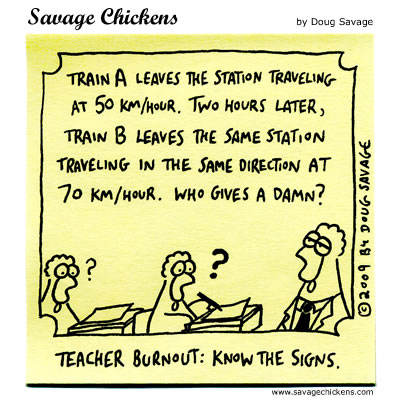I'm going to spend this week going through a list of dos and don'ts. Definitely question, comment, and add on! I always love these conversations!!
DOs:
- Be energetic.
- Students can smell weakness and feed on it like the brain slugs from Animorphs. Sound confident and it really does go a long way.
- My first year teaching I was driving a van load of students to a lake field trip. Along the way they said they could tell that it was Nematobrycon's first time teaching (the other TA, also female). Of course I told them it wasn't and that she deserved respect, teaching wasn't easy. Truth was though they had us backwards, I was the noob and Nematorbrycon was a seasoned veteran so to speak. The difference is I am loud and bouyant while she is quiet and short on speech, lending her to look unsure of herself regardless of her competence.

- Be engaging.
- Every chance to get to bring in student participation, do it. If nothing else they'll be less likely to fall asleep. It also helps to get a good feel for students and to learn names. Teach Socratically. The goal remember is to teach them how to learn, so by giving them some basics you can help them through just about anything.
- Use candy as a bribe, that works. Just make sure they know they can't eat it until they leave (no food in labs ya?).
- My coordinator also recommends "danger colors." I've never had to employ this method but basically you draw a color randomly and go around the room so anyone with that color on will have to answer. Depends on the students I think how well they would respond.
- Speak and write confidently.
- Give the students assurance that you know what you are babbling on about. Even if you feel like it's a weak subject for you, prewrite your board work and think about what you say. Fumble around or need to change something on the board and you will lose them fast. Super fast.
Don'ts
- Never say "Try harder"
- Seriously, never say this. Chances are the student is trying to their capacity (whatever that is) and even if they're not it's a very frustrated piece of advice. You look like a complete pompous douchebag and they will likely stop trying altogether and feel you are entirely unapproachable. Which you are.
- Never say " I don't know"
- Even if you don't know, there are other ways to handle the situation that doesn't make them lose their faith in you.
- Try attacking it socratically, can you think through it together?
- Is it really pertinent? If not say that's above the level required for the course and in an effort to stay on track let it slide for now. After class, look it up and have it open for THEM as a resource.
- Does it matter? Are they asking what the obscure stuffed animal in the corner is that was likely extinct 400 years ago? Then a "mmm I'm so sure on that one" is probably just fine.
- HOWEVER, NEVER EVER LIE to your students. For one they take what you say is truth and you can severely harm their learning. Moreover if they figure out you fibbed you lose all their confidence AND, again, you look like a pompous douchebag, albeit an incompetent one.
- Never let students run the joint.
- Some freedom in a lab setting is great, it teaches responsibility and add comfort to their learning process, allowing them to focus more. Some informality at this level works too, be friendly and you'll likely get more active discussion. However, there will come a time when you need to stomp on a student. Be sure that when push comes to shove no means no. Some of them will tests boundaries, make sure you set a solid example.

- Stay away from "wrong"
- Especially if you are in a discussion moment within the lecture and asking for feedback, telling a volunteer straight out they are wrong can slow the discussion down dramatically. Make sure to smile and keep a positive flow. Say things like "well that's a good start" or "okay what it we thought about it this way." Try to redirect without spurning their attempt.
That's a solid review. Drop in your questions and comments and we can add more. Next week I think some funny horror stories to bring in the realism!
"Good teaching is one-fourth preparation and three-fourths theater." Gail Godwin
No comments:
Post a Comment